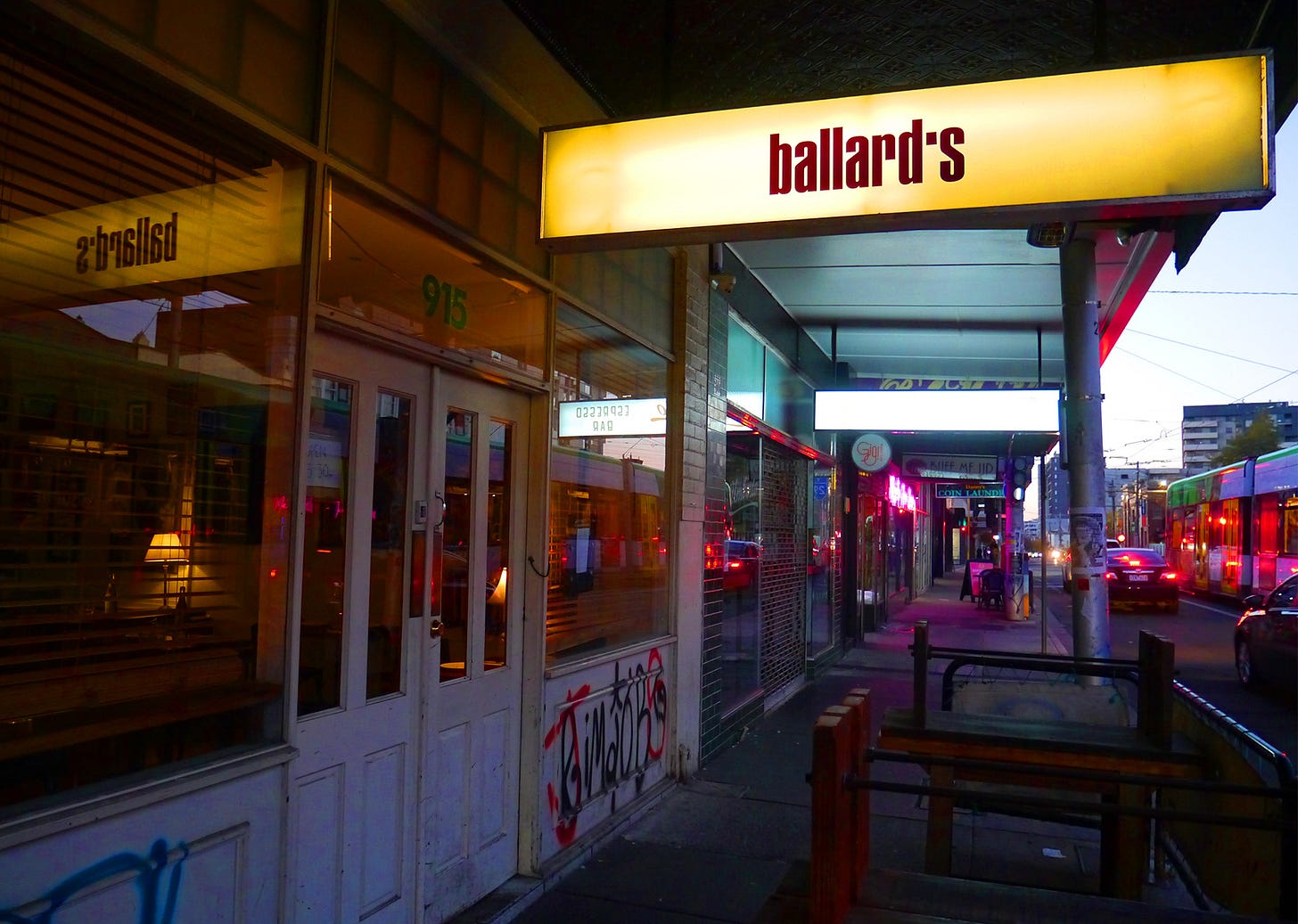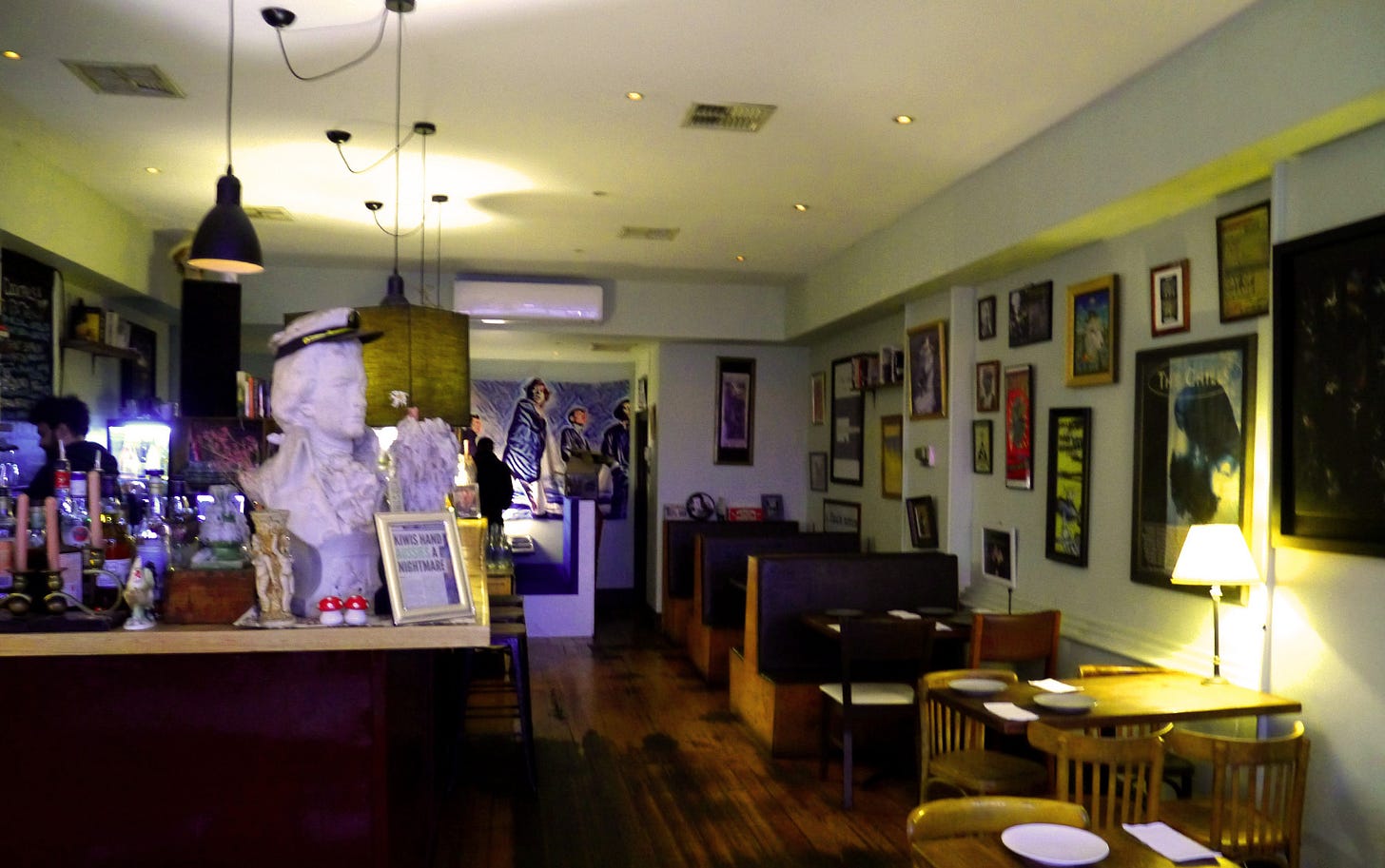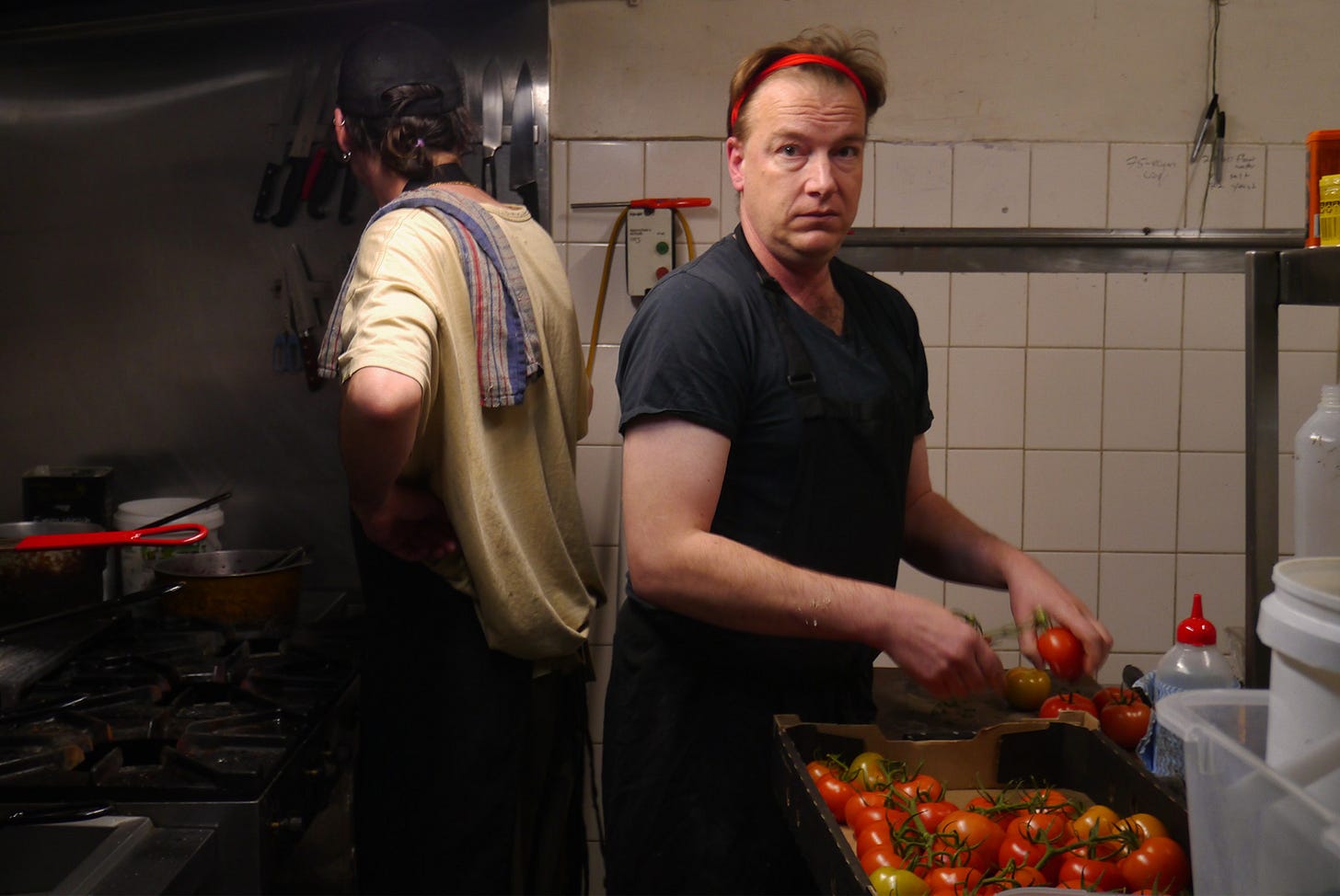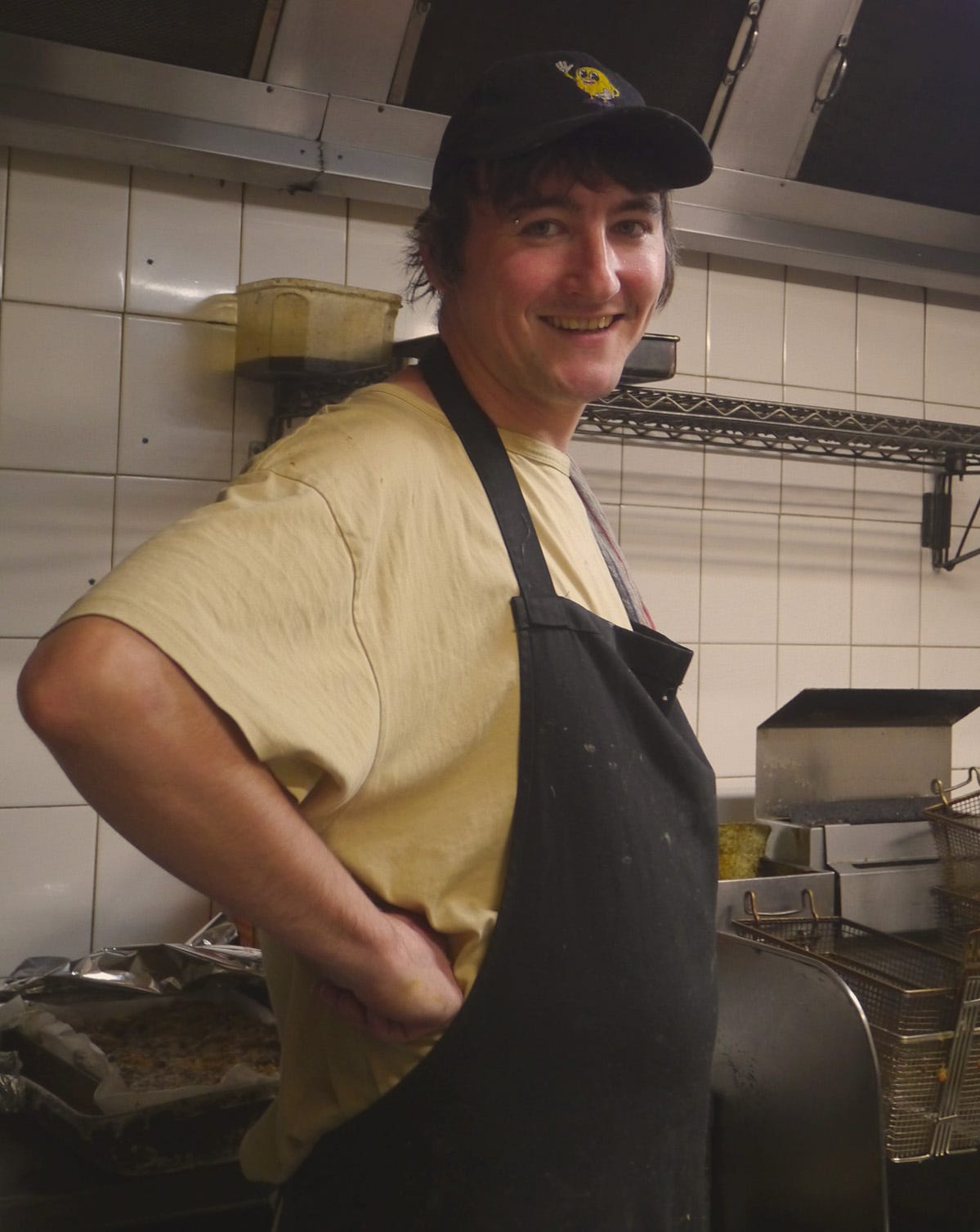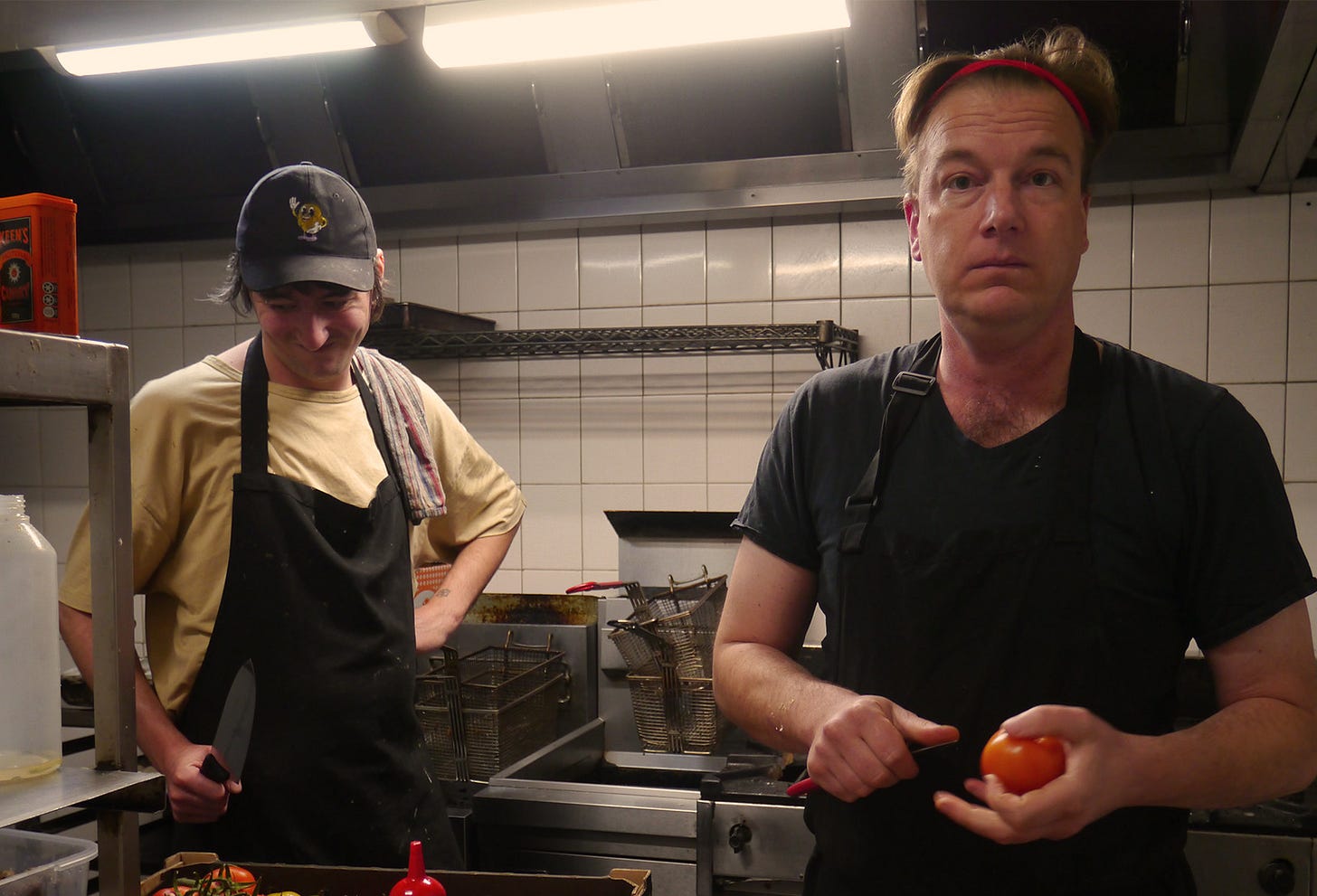What Makes Ballard’s Work?
An interview with the two busiest cooks in Ballard's
7pm, its a Winter Thursday and walking High street, Thornbury, packs of beautiful Melbournite’s pass you by as you wander up the street. Something is off though there weren’t as many bars as there were last time you wandered the streets in search of a good time.
Walking past Capers is a sight for sore eyes, the space is red warm and naturally its busy the people are happy, and the bartenders are killing it. But the bar isn't the vibe tonight, the place in mind is possibly the hottest spot in High street and you wouldn’t believe it, its vegan.
Ballard’s is defining itself as one of the best restaurants in the northside of Melbourne with its reasonably priced fine vegan meals and its strong sense of identity. The moment you walk in you are welcomed by the gruff sounds of yelling and gritty guitars of post punk music and a warm chatter from the patrons.
The walls are covered in character with post punk bleeding from the tv to the walls. It’s giving a well worn in, home of a man with eclectic even eccentric taste vibe. The punk nature of the place is also represented in the food with the menu being changed often to accommodate for a need of something fresh.
Behind Ballard’s culinary magic are the cooks, the owner and top cook Tamlyn Martinovich Faulkner and his trusty sous-cook Cal Stanley.
The decorum of Ballard’s is a perfect representation of its owner Tamlyn. A man of eclectic and considered ideas expressed through strong passion, subtle eccentricity, and a very quick wit.
Tamlyn began his career in cooking when he was studying for an honours in anthropology and a postgraduate diploma in psychology in his home country of New Zealand
Cooking wasn’t the career path he wanted to go down, he found himself in a postgraduate job in the department of internal affairs with aspirations to “change the world.” He thought “he was going to love working for the government” but this wasn’t to last as he found himself working in a “shitty paper factory, as people are dehumanised.”
“it was the most soul crushing moment” of his life, after he quit he ended up moving to the sunburnt land of Australia. With no intention to get back into cooking he ended up in his friends restaurant cooking, and within six months of being there, he was running it.
Instead of calling himself a chef he prefers cook “because I’m not trained, I’m self taught… a lot of its just having an enthusiasm to keep researching, asking questions and experimenting…a lot of the formalities and the structure behind technical cooking you’ll get, by doing the job.”
Tamlyn is no stranger to working obscene hours to running a social media account, creating new dishes, and dealing with customers and staff, but Cal Stanley insists that he’s there to share the load
Standing at 6’5” Cal Stanley from a distance is intimidating but as you get closer his kindness, sincerity and calm demeanour stands out.
Cal has been working in kitchens for 10 years and is no stranger to burnout in the kitchen but even when Ballard’s is incredibly busy he find’s work “easy.”
The kitchen environment is conducive of burnout, something Cal has experienced before working at Ballard’s. During the COVID pandemic, he had been working 50 hour weeks, and during his busiest weeks working he was also covering sick staff.
He had just been offered a pay raise and an opportunity to climb the ranks of the kitchen but after the weekend he had had enough. When Cal had gone out after his shift to unwind his sous-chef messaged him supporting him and saying, “you’ll be a sous-chef in no time.”
Cal woke up the next day and responded, “I’m not coming in tomorrow, I can’t do this shit…I don’t want to climb these ranks.” To the sous-chef’s disappointment Cal rejected the culture of the standard kitchen and after 6 months of working there he quit.
When his sous-chef asked, “what was going on?” Cal said “I was on the brink of a nervous breakdown.” The sous-chef responded, “I could’ve told you that.” To Cal it seemed almost like an expectation of the job as a chef to put yourself through the pressure.
Melbournite’s are often proud of the fact that Melbourne has a delicious fine dining scene but dig a little and you often hear stories of malpractice and toxic workspaces. Kitchens in particular seem to breed a culture of defined hierarchy and according to Tamlyn the “battalion” system, which gives each section their own responsibility, doesn’t nurture “the flow” Tamlyn believes is necessary to create a high volume of high quality meals
For Tamlyn a traditional kitchen reminds him “In many ways it just feeling like another way of bureaucracy, there shouldn’t be that piece of paper to tell you what to do…with those formally structured places, its about just throwing someone under the bus and going it’s your fault…rather than going how do we all work better together as a whole?”
“With a certain idea of a role, if you work as team that role is flexible…and that’s the difference of seeing real teamwork...In a supportive environment two people can do the work of four people.”
Cal is generally a skeptical person in terms of work culture but when he started working at Ballard’s he found himself to be respected and cared for as an equal by Tamlyn. For Cal in the other kitchens he had worked in there “was a dick measuring contest in how much you overexerted yourself in the kitchen.” But after working in Ballard’s for 8 months he finds “it’s pretty hardcore but I don’t feel overworked at this place, I just feel like it’s me doing my job.”
When hiring someone Tamlyn doesn’t look for experience he’d “rather someone with reasonable attitude and then we can actually try and develop someone from that point.” “the recurring theme in a lot of fine dining kitchen experiences is trauma inducing… its teaching people how to have speed, urgency and hustle.”
After seeing trauma throughout the industry Tamlyn asks the question “how do you work out a way to instill some of those values without having to have it done through abuse?” That thoughtfulness and consideration of other people’s difficult experiences is something small hospitality businesses need.
Cal has seen other cooks in the kitchen rapidly grow into their jobs “in my old jobs you’d see people stay as kitchen hand or dishy for years.” But this person who started in a kitchen six months ago “has genuinely grown…she’s gotten way better at her job...Tam and everybody has given her that space to find her legs whilst she’s studying and working in the fucking kitchen.”
Tamlyn seems to create an environment of respect and views his employees as assets instead of expecting loyalty in the kitchen. “I think it’s like lending a book. I always look at it like this, if I lend a book to someone, I almost make the assumption I’ll never get it back.”
Cal experienced the troubles of loyalty when his sous-chef didn’t speak to him for 8 months after he quit his fine dining job. “He didn't speak to me for eight months after that I would rock up to work and hang out in the kitchen realize that the sous chef was just hiding from me in the cool room or didn't want to talk to me.”
High street is one of the many high streets facing economic pressures of today with small business owners finding it easier to sell or liquidate. Running a small business is difficult, especially in the hospitality industry and Tamlyn feels that this year in particular Ballard’s has really found its identity and traction among the community.
“You have to make it happen yourself…one of the problems with small businesses is that you tend to end up not doing the good you’re actually good at….like, I’m really good at cooking, why am I fixing the toilet???”
With all the pressure of running a business and cooking most nights of the week Tamlyn also manages an Instagram well worth following. This chronic online presence of the Ballard’s Instagram page is Tamlyn’s escape from the kitchen and it juxtaposes the “beige banality” of your standard hospitality venue Instagram.
“I’m going to create meme’s and jokes and things like that and part of it was creating an idea about just trying to educate people on etiquette when they go out.” These post represent the punk attitude towards fine dining and the permeation of a new approach to hospitality that counters the old way of battalion kitchen’s and customer’s always right. “The customer should be listening and engaging with the venue…as soon as you learn how to act and asks questions and go, where do you want me? Everything goes away.”
The defining ethos behind Tamlyn’s is respect, respect for the craft, respect for his employees and respect for the community he’s trying to create around Ballard’s. “people who really focus on loyalty tend to do that with almost the expectation that you have to give up something of yourself…if it doesn’t work it doesn’t work.”
“Loyalty is something that gets really badgered around and can be actually used as a bad thing. That sense of that people owe you, the staff owe you and I don’t think the staff owe you anything. I think it should always be a mutually beneficial agreement.”


